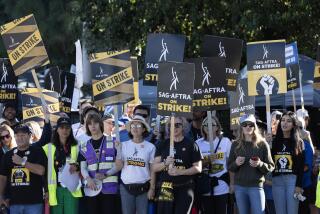Restarting the Talks Is Gradual Process
- Share via
NEW YORK — Negotiators moved to regain momentum Monday in baseball labor talks fast-approaching a deadline and sidetracked by last week’s contentious events, which included what sources called a verbal outburst by union head Don Fehr.
The sides, which did not meet Sunday, discussed ancillary matters in an attempt to reestablish dialogue after the Major League Baseball Players Assn. set an Aug. 30 strike deadline, and Fehr privately blasted management for making what he considered an unacceptable tax proposal in a session focusing on the core hurdle.
Although players are scheduled to strike in 10 days, potentially shutting down the sport for the ninth time in 30 years, owners and the union apparently are playing it cool, hoping to maintain civility entering the stretch run. The setting of the walkout date and Fehr’s frustration did not spur bargaining in a positive direction, prompting negotiators to take a few steps back with the clock ticking.
“Whenever you have an event in the process, the setting of a strike date, the actual strike, it causes a disruption to the process,” said Rob Manfred, baseball’s lead labor lawyer. “You could say that we went pretty hard, really, for two complete weeks.
“You do get to the point where people just need a day to clear their heads. That’s really all we took.”
The cooling-off period occurs with management and the union entrenched at opposite extremes on the payroll tax--a salary-restraint tool that many owners deem essential to establish competitive balance. Manfred has characterized the process with optimism, but the mood changed last Wednesday when management presented its latest tax proposal, sources said.
Fehr was dismayed by management’s counter to the union proposal, expressing his feelings in a tension-filled conference room.
Under the union offer, the minimum payroll subject to being taxed would be $130 million in 2003, $140 million in 2004 and $150 million in 2005, at which point the tax would end. The tax would be assessed at a rate of 15% for clubs above the threshold once, 25% twice and 30% three times.
Under the owners’ proposal, a team would be taxed at 37.5% the first time it exceeded the threshold, 42.5% the second time, 47.5% the third time and 50% the fourth time. Management, also seeking to have payroll based on 40-man instead of 25-man rosters, adopted the union tax-rate formula, but increased the threshold only $4 million--to $102 million--from its starting figure.
The minimal movement was greeted with anger by the union and Fehr, in particular, sources said, because its bargaining team figured hard-line owners were influencing the process, wasting time on a proposal that wouldn’t be taken seriously. Fehr does not discuss specifics in talks, and Manfred responded to Wednesday’s events by saying, “I never said Don made an outburst, and I’m not going to comment on whether it was disruptive.”
The sides are seemingly refocused after returning from their corners, but much work remains to bridge the gap, even on issues other than the payroll tax and increased revenue sharing, which, in combination, the union views as a salary cap by another name. Loose ends remain on steroid testing and a worldwide draft, which could force the Dodgers to shut down their operation in the Dominican Republic.
Negotiations are expected to revert to the tax issue later this week, but significant movement probably won’t occur until shortly before the strike date. Management and union sources remain hopeful because the sides are prepared to make concessions on tax thresholds and rates.
“We made the last proposal on a luxury tax, and in terms of how [that discussion] restarts, I’m just not going to speculate,” Manfred said. “How we return to the topic, I just can’t tell you that right now, but I want to be clear: If we’re going to make an agreement, everybody is going to have to have some wiggle room on this topic.”
More to Read
Go beyond the scoreboard
Get the latest on L.A.'s teams in the daily Sports Report newsletter.
You may occasionally receive promotional content from the Los Angeles Times.










